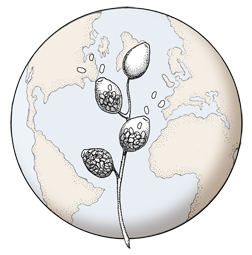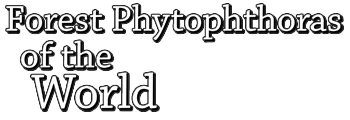References
Export 603 results:
[ Author ] Title Type Year
] Title Type Year Filters: Re-evaluation-phytophthora-species-isolated-during-30-years-vegetation-health-surveys-0 is [Clear All Filters]
. Evidence for the role of synchronicity between host phenology and pathogen activity in the distribution of sudden oak death canker disease. New Phytologist [Internet]. 2008 ;179:505–514. Available from: http://dx.doi.org/10.1111/j.1469-8137.2008.02450.x
. A crown rot of hollyhock caused by Phytophthora megasperma n. sp. J Wash Acad Sci. 1931 ;21:513-526.
. First evidence of genetic-based tolerance to red needle cast caused by Phytophthora pluvialis in radiata pine. New Zealand Journal of Forestry Science [Internet]. 2014 ;44:31. Available from: http://www.nzjforestryscience.com/content/44/1/31
. Control of Phytophthora cinnamomi with phosphite: some recent developments in application methods. Australasian Plant Conservation [Internet]. 2005 ;34:10–11. Available from: http://researchrepository.murdoch.edu.au/2427/
. An overview of Australia’s Phytophthora species assemblage in natural ecosystems recovered from a survey in Victoria. IMA Fungus [Internet]. 2016 ;7(1):47-58. Available from: http://www.ingentaconnect.com/content/ima/imafung/pre-prints/content-k4_Vol7_no1_Article4
. AFLP analysis reveals a clonal population of Phytophthora pinifolia in Chile. Fungal Biology [Internet]. 2010 ;114:746 - 752. Available from: http://www.sciencedirect.com/science/article/B9879-50GMMRW-1/2/c0c76996906d7b589f9430c65d0b2880
. DNA-based method for rapid identification of the pine pathogen, Phytophthora pinifolia. FEMS Microbiology Letters [Internet]. 2009 ;298:99-104. Available from: http://onlinelibrary.wiley.com/doi/10.1111/j.1574-6968.2009.01700.x/abstract
. Phytophthora pinifolia sp. nov. associated with a serious needle disease of Pinus radiata in Chile. Plant Pathology [Internet]. 2008 ;57:715–727. Available from: http://dx.doi.org/10.1111/j.1365-3059.2008.01893.x
. Scientific opinion on the pest risk analysis on Phytophthora ramorum prepared by the FP6 project RAPRA. EFSA Journal [Internet]. 2011 ;9(6):107 pp. Available from: http://www.efsa.europa.eu/en/efsajournal/pub/2186.htm
. Variation among Phytophthora cinnamomi isolates from oak forest soils in the eastern United States. Plant Disease [Internet]. 2012 ;96:1608-1614. Available from: http://dx.doi.org/10.1094/PDIS-02-12-0140-RE
. A statistical model to detect asymptomatic infectious individuals with an application in the Phytophthora alni-Induced alder decline. Phytopathology [Internet]. 2010 ;100:1262-1269. Available from: http://dx.doi.org/10.1094/PHYTO-05-10-0140
. An improved method for qPCR detection of three Phytophthora spp. in forest and woodland soils in northern Britain . Forest Pathology [Internet]. 2015 ;45(6):537–539. Available from: http://doi.wiley.com/10.1111/efp.12224http://api.wiley.com/onlinelibrary/tdm/v1/articles/10.1111%2Fefp.12224
. Phenotypic differences among three clonal lineages of Phytophthora ramorum. Forest Pathology [Internet]. 2011 ;41:7–14. Available from: http://dx.doi.org/10.1111/j.1439-0329.2009.00627.x
. PCR-RFLP markers identify three lineages of the North American and European populations of Phytophthora ramorum. Forest Pathology [Internet]. 2009 ;39:266–278. Available from: http://dx.doi.org/10.1111/j.1439-0329.2008.00586.x
. Development of a Nested Quantitative Real-Time PCR for Detecting Phytophthora cinnamomi in Persea americana Rootstocks. Plant Disease [Internet]. 2013 ;97(8):1012 - 1017. Available from: http://dx.doi.org/10.1094/PDIS-11-12-1007-RE
. Growth and sporulation of Phytophthora ramorum in vitro in response to temperature and light. Mycologia [Internet]. 2006 ;98:365-373. Available from: http://www.mycologia.org/cgi/content/abstract/98/3/365
. Interaction of light and sterol on sporangium and chlamydospore production by Phytophthora lateralis. Phytopathology. 1980 ;70:650-654.
. Species hybrids in the genus Phytophthora with emphasis on the alder pathogen Phytophthora alni: a review. European Journal of Plant Pathology [Internet]. 2008 ;122:31-39. Available from: http://dx.doi.org/10.1007/s10658-008-9296-z
. Phytophthora diseases worldwide. St. Paul, MN: APS Press, American Phytopathological Society; 1996 p. 562 pp.
. Phosphite primed defence responses and enhanced expression of defence genes in Arabidopsis thaliana infected with Phytophthora cinnamomi. Plant Pathology [Internet]. 2011 ;60:1086–1095. Available from: http://dx.doi.org/10.1111/j.1365-3059.2011.02471.x
. Lineage, Temperature, and Host Species have Interacting Effects on Lesion Development in Phytophthora ramorum. Plant Disease [Internet]. 2014 ;98(12):1717 - 1727. Available from: http://apsjournals.apsnet.org/doi/abs/10.1094/PDIS-02-14-0151-RE
. Detection, Diversity, and Population Dynamics of Waterborne Phytophthora ramorum Populations. Phytopathology [Internet]. 2015 ;105(1):57 - 68. Available from: http://apsjournals.apsnet.org/doi/abs/10.1094/PHYTO-07-13-0196-R
. Persistence of Phytophthora ramorum and Phytophthora kernoviae in U.K. natural areas and implications for North American forests . 2009 ;Gen. Tech. Rep. PSW-GTR-229:83-84.
. Root infections may challenge management of invasive Phytophthora spp. in U.K. woodlands. Plant Disease [Internet]. 2011 ;95:13-18. Available from: http://apsjournals.apsnet.org/doi/abs/10.1094/PDIS-03-10-0236
. Survival, dispersal, and potential soil-mediated suppression of Phytophthora ramorum in a California redwood-tanoak Forest. Phytopathology [Internet]. 2009 ;99:608-619. Available from: http://apsjournals.apsnet.org/doi/abs/10.1094/PHYTO-99-5-0608


